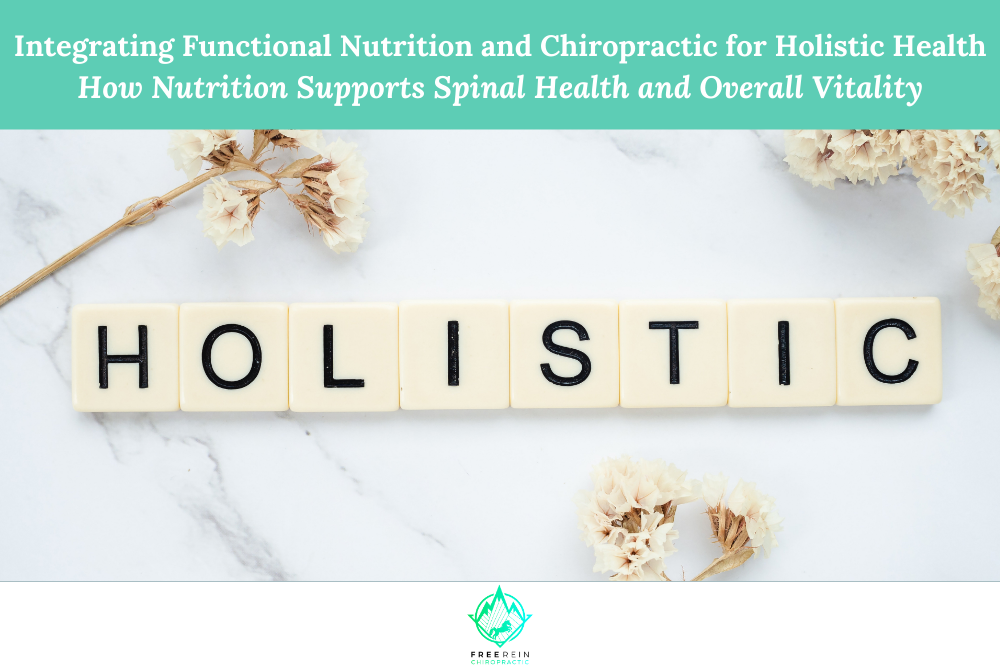 How Nutrition Supports Spinal Health and Overall Vitality
How Nutrition Supports Spinal Health and Overall Vitality
At Free Rein Chiropractic in Kalispell, MT, we believe in a whole-body approach to health. Chiropractic care is a powerful tool for aligning the spine, reducing pain, and enhancing mobility, but true wellness extends beyond adjustments. Functional nutrition plays a crucial role in supporting musculoskeletal health, reducing inflammation, and promoting optimal healing and vitality.
If you’re seeking lasting relief and a stronger, healthier body, integrating chiropractic care with proper nutrition can make all the difference. Let’s explore the connection between what you eat and how your spine, muscles, and nervous system function.
The Role of Nutrition in Chiropractic Care
The foods we consume directly affect our body’s ability to heal, maintain flexibility, and reduce pain and inflammation. Chiropractic adjustments help align the spine and improve nervous system function, but without proper nutrition, healing may be slower and less effective.
1. Reducing Inflammation for Joint and Muscle Health
Chronic inflammation is a major contributor to pain and stiffness. A pro-inflammatory diet high in processed foods, sugar, and unhealthy fats can increase discomfort and slow recovery from spinal misalignments.
Anti-Inflammatory Foods to Include:
- Fatty fish (salmon, sardines, mackerel): Rich in Omega-3s, which help reduce inflammation in joints.
- Berries (blueberries, strawberries, raspberries): Packed with flavonoids that reduce inflammation.
2. Supporting Spinal Health with Essential Nutrients
The spine requires key vitamins and minerals to maintain strength, flexibility, and structural integrity.
Nutrients for a Healthy Spine:
- Calcium & Vitamin D: Essential for strong bones and spinal discs.
- Magnesium: Helps relax muscles and prevent spasms.
- Collagen & Vitamin C: Support disc and joint health.
- Improving Energy and Nervous System Function
The nervous system controls every function in the body, including digestion, movement, and pain perception. Chiropractic care ensures proper nerve flow, but nutrient-dense foods enhance these effects.
Energy-Boosting and Nervous System-Supportive Foods:
- Healthy fats (avocados, olive oil): Support brain function and nerve signaling.
- Protein (meats, eggs): Provides amino acids for muscle repair and nerve function.
Key Dietary Strategies for Chiropractic Patients
1. Stay Hydrated
Water is essential for spinal discs, which act as shock absorbers between vertebrae. Dehydration can cause discs to lose flexibility and height, leading to pain. Aim for at least 8 glasses of water per day.
2. Avoid Inflammatory Foods
Steer clear of:
- Refined sugars and processed foods (chips, sodas, candy)
- Trans fats (fried foods, margarine, fast food)
- Excess caffeine and alcohol, which dehydrate the body
3. Consider Supplementation
For those who struggle to get all nutrients from food, supplements such as Omega-3s, Vitamin D, Magnesium, and Probiotics can support spinal and nervous system health.
4. Eat to Support Gut Health
The gut and spine are closely connected through the nervous system. A healthy gut microbiome reduces inflammation and improves nutrient absorption. Incorporate:
- Probiotics (yogurt, kefir, sauerkraut)
Comprehensive Q&A Section
Q: How does diet impact my chiropractic treatments?
A: A nutrient-rich diet reduces inflammation, supports tissue repair, and enhances nerve function, making adjustments more effective and longer-lasting.
Q: Can poor nutrition cause back pain?
A: Yes. Deficiencies in calcium, vitamin D, and magnesium can weaken bones and muscles, leading to spinal misalignments, muscle cramps, and joint pain.
Q: What foods should I eat to recover faster from a chiropractic adjustment?
A: Focus on anti-inflammatory foods, lean proteins, and healthy fats to support muscle recovery, nerve function, and joint flexibility.
Q: Are there specific foods that can help with nerve pain?
A: Yes. Omega-3 fatty acids (salmon, walnuts), B vitamins (eggs,), and turmeric can help reduce nerve-related pain.
Q: Should I take supplements to support my chiropractic care?
A: It depends on your diet. Vitamin D, Magnesium, and Omega-3s can be beneficial, but it’s always best to get nutrients from whole foods first.
Q: How can chiropractic care improve digestion?
A: Spinal misalignments can affect nerve function in the gut, leading to bloating, constipation, or acid reflux. Adjustments restore proper nerve flow, improving digestion.
Q: How does hydration affect my spine?
A: Water helps keep spinal discs hydrated, preventing compression and stiffness. Dehydration can lead to increased pain and discomfort.
Take a Holistic Approach to Health with Free Rein Chiropractic
At Free Rein Chiropractic, we prioritize a comprehensive approach to healing that includes chiropractic adjustments, functional nutrition, and lifestyle modifications. Whether you’re dealing with chronic pain, recovering from an injury, or seeking optimal well-being, integrating healthy dietary choices with chiropractic care can transform your health.
Schedule Your Appointment Today!
📍 Free Rein Chiropractic
📍 135 Hutton Ranch Road #102, Kalispell, MT 59901
📞 (406) 890-6989
Let us help you achieve true balance, vitality, and pain-free living through chiropractic care and functional nutrition!
